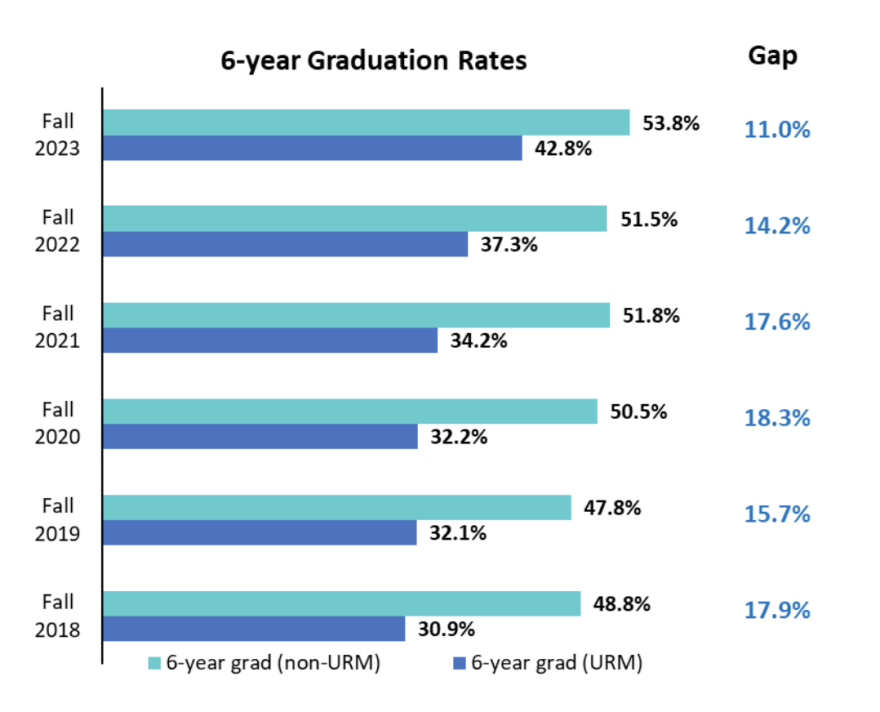A college degree generally raises a person’s earnings over their lifetime. But the path to graduation isn’t easy. Students face financial, academic, and administrative hurdles.
Students of color and low-income students are more likely to get tripped up by these challenges, and it shows in graduation and retention rates.
At UW-Milwaukee, the graduation rate is 51% overall, but only 43% for underrepresented minority students.
In 2020, UWM, UW-Parkside, Carthage College, and MATC committed to closing racial and economic graduation gaps, as part of an initiative called “Moon Shot for Equity.”
The schools partnered with education consultant EAB to make the path to graduation easier for students.
"It really is about breaking down barriers — perhaps structures that we have in place — and promoting student success," says UWM Associate Vice Chancellor Phyllis King, who has been leading the Moon Shot work.
Three years into the project, here are some of the behind-the-scenes changes UWM has made to try to close achievement gaps for students.
Hold Reform
UWM puts "holds" on students' accounts when they have an unpaid tuition balance or paperwork issue. The holds prevent students from registering for classes, and they disproportionately affect underrepresented minority students.
"We needed to clean up our act around holds," King says. "This is an institutional barrier we're putting on the students — do they make sense?"
First, UWM audited its hold practices and created a policy that requires a hold to be reviewed by a committee.
UWM also raised the past-due balance hold threshold from $50 to $1,500. That means a student who owes less than $1,500 can still register for classes.
Retention Grants
In conjunction with hold reform, UWM piloted the use of "retention grants" targeting low-income students in their junior or senior year whose tuition balances were preventing them from registering.
The grants lowered student's tuition bills, getting them below the $1,500 hold threshold and allowing them to continue their studies.
"It completed closed the equity gap," King says. "Underrepresented minority students [who received retention grants] were able to graduate at the same rate, or were retained at the same rate, as non-underrepresented students."
King says more than 600 students have received retention grants. About 80% of the recipients stayed at UWM after receiving the funds.
Advising
UWM has turned to predictive analytics to inform its advising work. Software called Navigate360 looks at 10 years of student data to predict when a student may need academic support or other help.
"We can predict students and advise them in a much more intelligent way," King says. "We don't have to wait until there's a red flag on a student's grade. We can be proactive ... and get them more immediate help."
King says UWM has hired a couple employees to help with the more proactive approach to student success. But financial limitations mean UWM has to "work smarter" with the staff it has.
Has it been successful?
The graduation gap between UWM's underrepresented minority students and their peers has shrunk from 18% in fall 2020 to 11% in fall 2023. Four-year graduation rates for underrepresented minority students have increased from 15.5% in fall 2020 to 20% in fall 2023.

Six-year graduation rates have gone up for Pell-eligible (low-income) students as well. Those rates increased from 36% in 2020 to 44% in 2023.
Retention rates haven't seen the same progress. Underrepresented minority student retention decreased from 74% to 62% between 2020 and 2023.
"The graduation rates are rising and that's tremendous," King says. "I think we have to stay the course and every day ask 'How can we best serve the students we have?'"
Other reforms comings
Recently UWM announced changes to help transfer students earn a bachelor's degree.
UWM is now guaranteeing admission to transfer students from four area technical colleges, including MATC. It is also pledging to accept 60 credits from transfer students — putting them halfway toward earning a bachelor's degree.
You can read more about UWM's Moon Shot for Equity work here.
Editor's note: WUWM is a service of UW-Milwaukee.
Correction: After this report and interview were published, UWM clarified that the previous tuition balance hold amount was $50, not $500.
_






